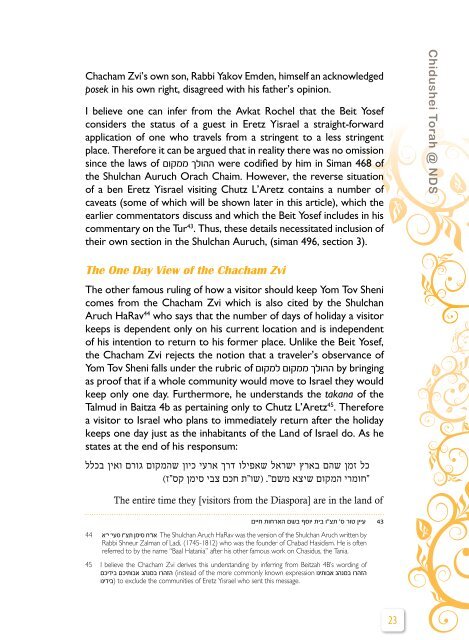Y om T o v Sheni Yom Tov Sheni - Chidushei Torah@NDS
Y om T o v Sheni Yom Tov Sheni - Chidushei Torah@NDS
Y om T o v Sheni Yom Tov Sheni - Chidushei Torah@NDS
You also want an ePaper? Increase the reach of your titles
YUMPU automatically turns print PDFs into web optimized ePapers that Google loves.
Chacham Zvi’s own son, Rabbi Yakov Emden, himself an acknowledged<br />
posek in his own right, disagreed with his father’s opinion.<br />
I believe one can infer fr<strong>om</strong> the Avkat Rochel that the Beit Yosef<br />
considers the status of a guest in Eretz Yisrael a straight-forward<br />
application of one who travels fr<strong>om</strong> a stringent to a less stringent<br />
place. Therefore it can be argued that in reality there was no <strong>om</strong>ission<br />
since the laws of םוקממ ךלוהה were codified by him in Siman 468 of<br />
the Shulchan Auruch Orach Chaim. However, the reverse situation<br />
of a ben Eretz Yisrael visiting Chutz L’Aretz contains a number of<br />
caveats (s<strong>om</strong>e of which will be shown later in this article), which the<br />
earlier c<strong>om</strong>mentators discuss and which the Beit Yosef includes in his<br />
c<strong>om</strong>mentary on the Tur 43 . Thus, these details necessitated inclusion of<br />
their own section in the Shulchan Auruch, (siman 496, section 3).<br />
The One Day View of the Chacham Zvi<br />
The other famous ruling of how a visitor should keep Y<strong>om</strong> <strong>Tov</strong> <strong>Sheni</strong><br />
c<strong>om</strong>es fr<strong>om</strong> the Chacham Zvi which is also cited by the Shulchan<br />
Aruch HaRav 44 who says that the number of days of holiday a visitor<br />
keeps is dependent only on his current location and is independent<br />
of his intention to return to his former place. Unlike the Beit Yosef,<br />
the Chacham Zvi rejects the notion that a traveler’s observance of<br />
Y<strong>om</strong> <strong>Tov</strong> <strong>Sheni</strong> falls under the rubric of םוקמל םוקממ ךלוהה by bringing<br />
as proof that if a whole c<strong>om</strong>munity would move to Israel they would<br />
keep only one day. Furthermore, he understands the takana of the<br />
Talmud in Baitza 4b as pertaining only to Chutz L’Aretz 45 . Therefore<br />
a visitor to Israel who plans to immediately return after the holiday<br />
keeps one day just as the inhabitants of the Land of Israel do. As he<br />
states at the end of his responsum:<br />
ללכב ןיאו םרוג םוקמהש ןויכ יערא ךרד וליפאש לארשי ץראב םהש ןמז לכ<br />
)ז”סק ןמיס יבצ םכח ת”וש( .”םשמ אציש םוקמה ירמוח“<br />
The entire time they [visitors fr<strong>om</strong> the Diaspora] are in the land of<br />
םייח תוחראה םשב ףסוי תיב ו”צת ’ס רוט ןייע 43<br />
44 א”י ’יעס ו”צת ןמיס ח”וא The Shulchan Aruch HaRav was the version of the Shulchan Aruch written by<br />
Rabbi Shneur Zalman of Ladi, (1745-1812) who was the founder of Chabad Hasidism. He is often<br />
referred to by the name “Baal Hatania” after his other famous work on Chasidus, the Tania.<br />
45 I believe the Chacham Zvi derives this understanding by inferring fr<strong>om</strong> Beitzah 4B’s wording of<br />
םכידיב םכיתובא גהנמב ורהזה (instead of the more c<strong>om</strong>monly known expression וניתובא גהנמב ורהזה<br />
ונידיב) to exclude the c<strong>om</strong>munities of Eretz Yisrael who sent this message.<br />
23<br />
<strong>Chidushei</strong> Torah @ NDS


